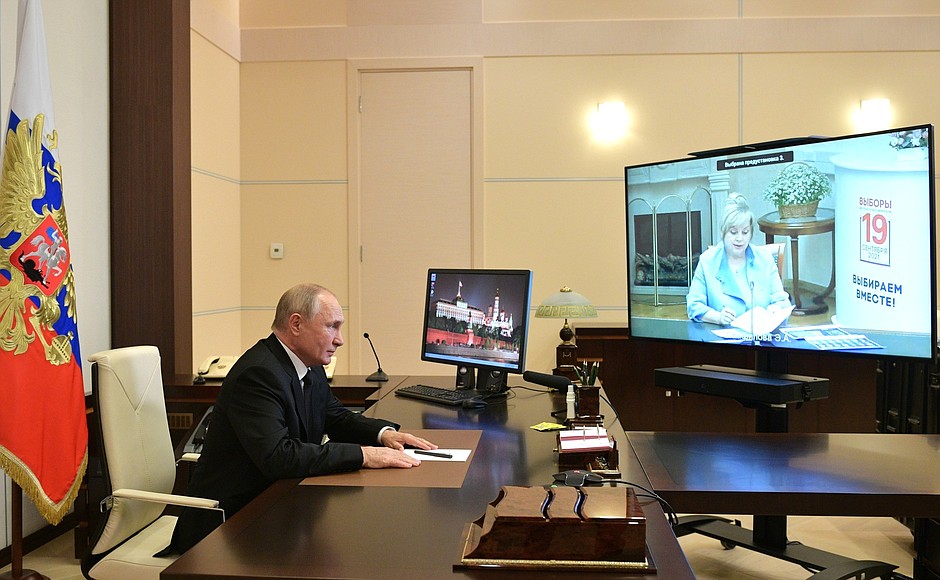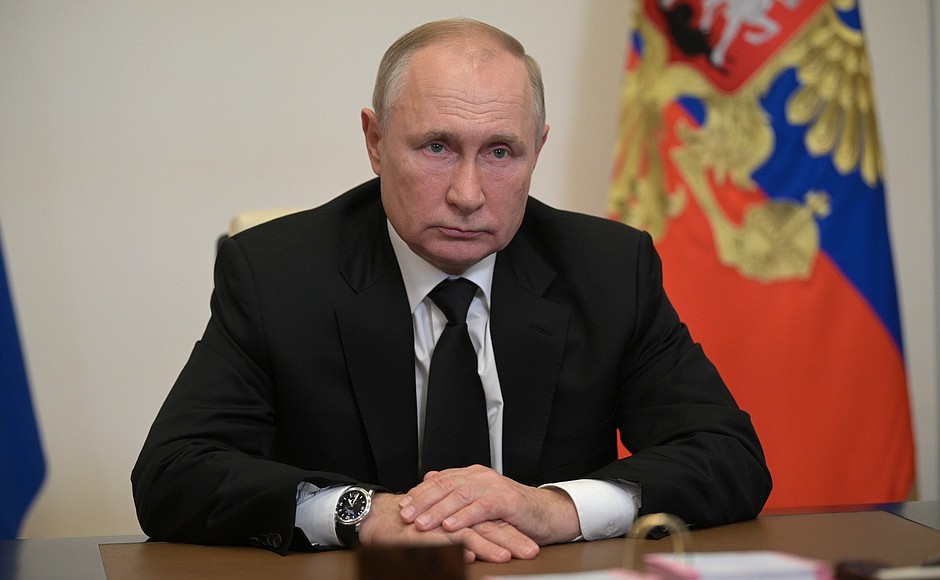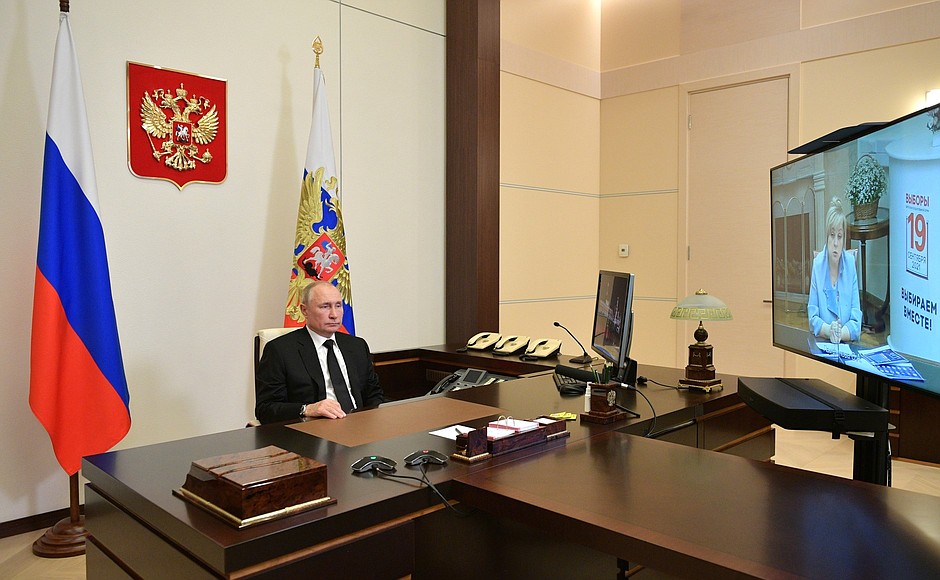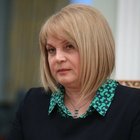President of Russia Vladimir Putin: Ms Pamfilova, good afternoon.
Chairperson of the Central Election Commission Ella Pamfilova: Good afternoon, Mr President.
Vladimir Putin: Ms Pamfilova, we arranged this meeting to discuss the election to the State Duma, our national parliament.
However, I have to begin this meeting with a different subject. First of all, I would like to express my condolences on the tragedy that happened today in Perm. I am fully aware of the fact that no words of sympathy can ease the bitter loss or pain, especially when talking about young people who were only just starting out in their lives. This is an enormous tragedy not only for the families who lost their children, but for the entire country.
The law enforcement agencies will do what it takes to investigate this horrible crime and to get to the bottom of what happened there. Both the regional and federal agencies will do everything to support the victims, as well as the families who lost their young ones.
Ms Pamfilova, please, you can now go ahead with your report.
Central Election Commission Chairperson Ella Pamfilova: I fully share this grief, Mr President.
When we were compiling the intermediate results, I mentioned that we have also had losses over the past three days. A young colleague of ours, a member of the electoral commission, aged 42, with three children, died of a heart attack from overexertion after working for one day. Several people were taken to hospital with heart attacks, so this campaign cost us. You are absolutely right, nothing can make up for the pain of this loss.
If we compare the election campaign that just took place to the 2016 campaign, it is so much different. Frankly, I have never experienced such a challenging election process, at least as long as I have held this position.
Perhaps, it is not just because the federal campaign season took place amid the pandemic, which was a challenge in and of itself, but we also needed to hold the voting over three days to ensure the sanitary and epidemiological safety of the voters and commission members, and everyone participating in the electoral process.
But it was also a challenge because we had to deal with unprecedented attacks and a massive and unprecedented effort to thwart and discredit our elections. I discussed this with my colleagues today and we agreed that we have never seen this kind of pressure or intensity of various kinds of attacks on our digital resources. The systems withstood the attacks, and I want to thank our staff who ensured this.
The other big difference is that we have made an incredible technological breakthrough over the past five years. Our system is one of the world’s most transparent, if not the most transparent.
Thinking back to five years ago, there was no such thing as a Mobile Voter mechanism and voters had to use absentee ballots. The Mobile Voter allowed our citizens to vote from anywhere in Russia. QR-coding and other innovations have, of course, expanded voters’ options, and the system has become more user friendly and accessible. The level of transparency that we ensured made total multitier control over the elections possible. Looking back at what it was and what it is now, it is a major leap forward.
The recent introduction of the latest digital services was very helpful. We are developing remote e-voting. We are now using new technology, and our colleagues, candidates for deputy positions at the regional level, can collect up to half of all signatures in e-format.
Our services and technical capabilities proved to be critical during the pandemic. We received many international observers and experts and all of them were interested in our experience because remote communication, contact-free notification, remote voting and remote collection of signatures, and the many other processes we introduced were certainly components of security.
Regardless of any pandemic we have to live through, we cannot cancel our most important events. We must go on and adapt to current conditions. This includes new technical upgrades. We are ahead even of many domestic departments in this respect, which facilitates this goal.
What else made these elections different? Everyone predicted low turnout but it was higher than five years ago. Now it stands at 51.68 percent. This is a tentative estimate for now. We still have more votes to count, but just a small fraction is left.
Mr President, we would like to sum up the results by Friday at the earliest because I strongly advised all our colleagues in the regions not to rush (because in addition to the State Duma elections, there were some 4,400 other elections, including top officials, to legislative assemblies in 39 regions, and municipal elections).
Integrity in these elections is the most important thing. I would like to suggest strongly the following, and we will monitor this: before officially announcing the results, we will meticulously review all complaints and messages if they are sent to the commission, and do this in the presence of applicants, to make sure there are no doubts about the voting results. Only after this can we sum up the outcome. We worked so hard for the integrity of this election that we do not want any neglect to smear our reputation.
I am also quite excited, all these sleepless nights…
Of course, I am grateful to our colleagues.
Overall, the number of complaints that we have received so far is at an all-time low. The other thing that makes this election different is the level of transparency that we have come up with. Even though there are fewer complaints and violations, all of them are exposed immediately. Like I say, there is nothing hidden that will not be disclosed, and quickly. The system is now focusing on this, so nothing can be hidden.
This was promoted by the fact that we had an unprecedentedly large number of “live” observers – almost half a million, 491,000 observers from the parties and the candidates, and our public observers. Live observation was reinforced by the unparalleled video surveillance system that we used this year.
Thanks to your initiative, a video surveillance system was introduced in 2012. It was an unprecedented innovation, and it was welcomed by everyone. However, we cannot afford using it now, Mr President, because we cannot compare 2012 to what we have now, as it is almost a different era. There were no cyberattacks, no cyber or information wars, and no such unfriendly behaviour towards Russia, which implied the desire of many of our so-called partners to discredit these elections.
Given these circumstances, and in order not to run up the cost, we came up with a distinct and well-designed, targeted professional video surveillance system that covered almost 96 percent of the election commissions and polling stations where over 96 percent of potential voters could actually cast their ballots.
For more than 70 hours, that is, during the three days and nights of the election, there was total video surveillance of what was happening at the polling stations. Day and night. It did not go directly to the internet, but to a dedicated website, and it was recorded. The political parties, the participants, and all their regional branches, as well as single-mandate candidates created a public observation centre, so any voter could come and observe what was going on. We had the human rights commissioner step up. They all had access to this website and were able to monitor what was happening at the polling stations and to prevent potential violations, as well as to document them, if detected.
Importantly, a rewind option was available so if a violation was detected, the recording could be rewound. This is a major extra source of control. We extended the storage period for these records to one year in case a court needs them, so a violator can be prosecuted.
Mr President, returning to the question of why it is so important to hold violators accountable, even with so few deliberate violations, it is important for preventing this problem in the future, because this is a blow to our national reputation. We cannot allow this to happen because the system we have created… Once again, many of the experts who visited us praised the system. The people who work at the commission represent the entire socio-political spectrum of society. It promotes the development of society. Therefore, I would like to ask you, before officially announcing the outcome, to cancel the elections mercilessly if you see any violations, if there is even the slightest doubt in their results.
So, Mr President, we have a fighting attitude.
Vladimir Putin: I see.
Ms Pamfilova, I know that the members of the election committees at various levels used all of their knowledge and experience, and were very responsible in fulfilling their duties. I would like to thank all of you for that.
Of course, I would like to convey special thanks to the citizens of Russia, to thank them for their confidence and, my friends, for your active position in life. Indeed, a turnout of 51 percent, 51 percent is much higher than the 47 percent at the previous elections. This shows that people have a responsible attitude towards electing the country’s top representative body – the State Duma. Stability in the country, Russia’s prosperity and progress truly depend on its work.
I am hoping that the deputies to the State Duma of the eighth convocation from the various political parties, those who will join Russia’s top representative body, will do all they can to justify the trust of their voters. We have one common goal – the prosperity of Russia and its people.
Thank you.



